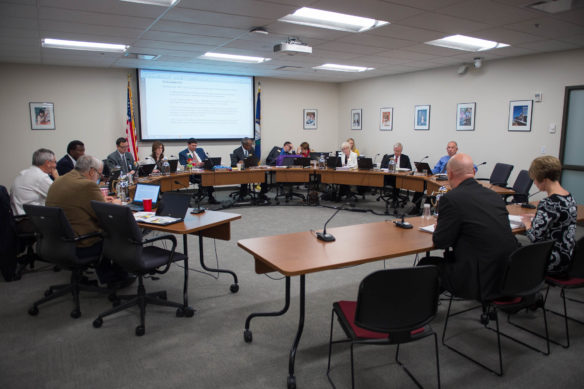
The 2017 Regular Session for the Kentucky General Assembly is underway. One education issue rising to the top of the list for policymakers is charter schools. At a special meeting in early December, the Kentucky Board of Education advanced a list of best practices it hopes the legislature will consider if it moves forward with charter legislation.
Photo by Bobby Ellis, Dec. 7, 2016
By Tracy Goff Herman
tracy.herman@education.ky.gov
For the first time since 1921, the Republicans will control the Kentucky House of Representatives. Republicans now hold the majority in both chambers of the legislature, as well as the governor’s office.
The Kentucky House has 28 new members – more than a quarter of the body – and 23 of those are in the new majority. This sweep has given the Republicans a constitutional majority of 64-36 in the House. While this is the odd-numbered year, 30-day legislative session, a constitutional majority can review and pass revenue measures, which generally aren’t considered in the “short” session.
Even so, most public comments by leaders in both chambers have indicated that tax reform will not likely be considered this session, but will be worked on and then considered in a special session.
Leadership in both chambers have indicated a need to be deliberate in implementing new or changing existing laws. Both Senate President Robert Stivers and the new Speaker of the House Jeff Hoover have commented on focusing their efforts in the upcoming session on economic development issues, including passing right-to-work legislation and repealing prevailing wage requirements on construction projects.
However, one education issue rising to the top of the list for the 2017 Regular Session is charter schools. There has been some talk as to whether the legislature will pursue charters during the upcoming session or wait until the 2018 budget session when a financing option can be detailed. Regardless, authorizing legislation to allow charter schools in Kentucky will move forward.
There are questions about what that legislation enabling charter schools should include. After a recent study session, the Kentucky Board of Education (KBE) adopted a list of best practices in December, drawing on research detailing the successes and failures of charters in other states. Significant data and materials were presented to the KBE, which can be accessed here.
By reviewing this extensive research, the KBE was able to filter out some of the more problematic practices other states have encountered to develop a list of recommendations, including:
- requiring a limit on the number of authorizers and their duties to ensure performance and evaluation of the charter;
- excluding for-profit companies from operating charter schools;
- defining specific data and reporting requirements;
- giving precedence to charter applicants that are directing services to the most at-risk student populations;
- targeting enrollment to the most at-risk student populations; and
- clear financing options and direction to local boards of education and the state in handling public funds.
A few other education-related issues that continue to be discussed and may be acted on during this short session include: continued discussions on the pension systems, including the Teachers Retirement System (TRS); and the continued implementation of the current budget’s requirement to establish some performance based funding measures for postsecondary institutions.
PREFILED LEGISLATION
A few pieces of education legislation that were prefiled and that are related to education. A few of note:
BR 51 – An act relating to charter schools.
Sponsored by Sen. Gerald Neal, this act would authorize public charter schools and establish a charter school pilot project.
BR 113 – An act relating to interscholastic extracurricular activities.
Rep. Stan Lee is the sponsor of this legislation, which would allow a home school to participate in a public school interscholastic extracurricular activity and establishes criteria for participation therein.
BR 132 – An act relating to superintendent screening committee membership.
Sen. Reginald Thomas sponsored this legislation, which would require the appointment of a school equity council member – if an equity council exists – to the superintendent screening committee and allows a board to add a high school student to the superintendent screening committee.
BR 426 – An act relating to school councils.
Sponsored by Sen. John Schickel, this legislation would require the local school superintendent or designee (instead of the school-based decision making council) to establish school policies, make personnel decisions, determine instructional materials, determine student support services, plan professional development and fill principal vacancies. The bill would require superintendent to consult with principals and school councils.




Leave A Comment